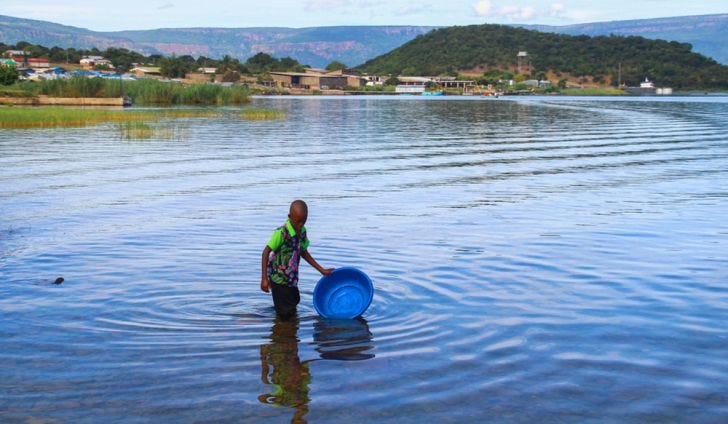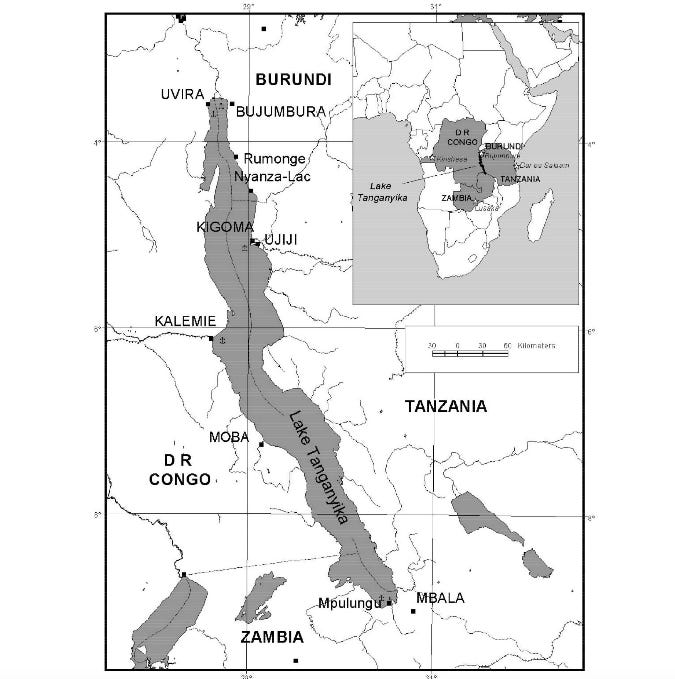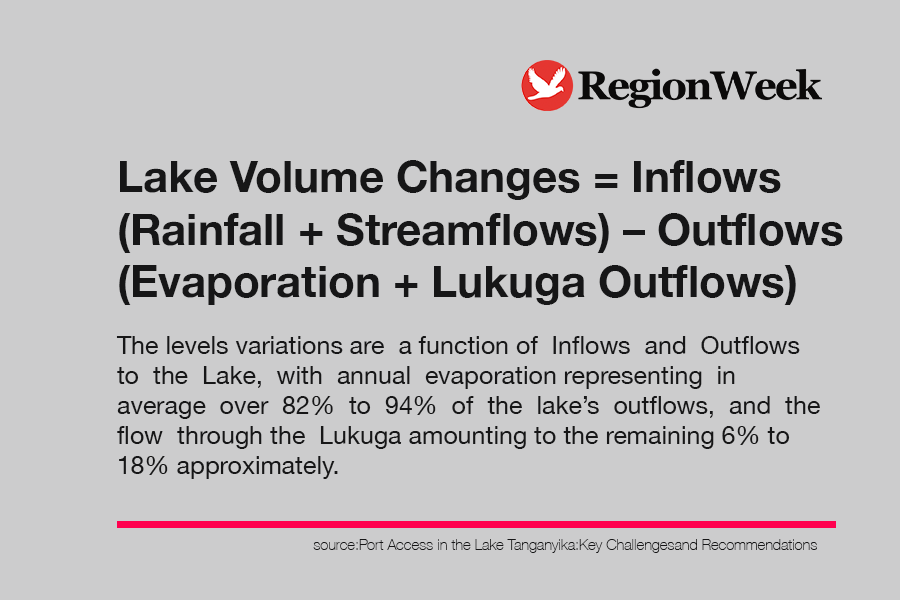Water level variations in Lake Tanganyika raise concerns
The Briefing Issue #63, Monday, March 30, 2020

Dear RegionWeek Readers
Last week when our attention was taken away by regional new Covid-19 cases, in Burundi, local media outlets reported on Lake Tanganyika’s water rising, in Rumonge Province and In Bujumbura.
Infrastructures such as residential houses, the port, fishing ports, kiosks, fields of crops, leisure centers were affected by the rising waters of Lake Tanganyika following heavy rainfall.
The waters of Lake Tanganyika overflown to over 10 meters of the habitual shores in Rumonge.
Ferdinand Niyokindi, the technical advisor to the municipal administrator of Rumonge who spoke to Burundi Eco Journalist, indicates that around twenty houses were damaged, especially in the Kanyenkoko district of Rumonge, tens of hectares of crops were destroyed, part of the commercial port and the fishing port is flooded.
Heavy rains in the area in recent days have caused human and material damage, one fisherman has died and another has been injured as a result of strong winds sweeping the lake and two people died when a house collapsed on them.
Some residents of the Kanyenkoko neighborhood bordering the city of Rumonge are moving to other neighborhoods that are sheltered from the rising waters of the lake.
Environmental specialists indicate that the province of Rumonge is a high-risk province. Efforts must be made to plant trees on the bare mountains which overhang the town of Rumonge, causing severe erosion.
According to Sylvain Tusanga Mukanga, executive director of the Lake Tanganyika Authority who spoke to Iwacu, this situation is the result of the deterioration of the environment.
“A lot of garbage is thrown into Lake Tanganyika which overflows the waters. There are no longer enough plants to contain the water. "
For him, the effects of climate change are causing the drying up of rivers or the overflowing of lakes and rivers.
In Bujumbura city for more than a month, the beach area has shrunk significantly, condemning almost all of the restaurant bars on the shores of Lake Tanganyika in Bujumbura. The rise of the waters of this lake due to the heavy rains of recent days.

Measuring 673 km at its main axis, Lake Tanganyika is the longest in the world and is between 12 and 90 km wide with a coastal perimeter of 1,838 km
Historically, Lake Tanganyika levels have oscillated between 773 and 776 m, and there is no evidence of long-term decreasing trends.
According to experts, lake level variations are both seasonal and interannual. Seasonal water level variations in Lake Tanganyika are due to the marked seasonality of rainfall and average 70 to 80cm depending on the year, with highest water levels at the end of the rainy season (October –May) and lowest water levels at the end of the dry season in September/October.
The inter-annual variation of lake levels is due to the variability of annual rainfall, depending on wetter or dryer years. The changes in a water volume of the lake, and thus lake levels, can be expressed as in the equation below.
In wetter years, when inflows are greater than outflows, the change in volume is positive and lake levels increase; in dryer years, lake levels decrease. As is common in natural processes, an occasional series of wet years stacked together can cause an increasing short-term trend, and a series of dry years can cause a decreasing short-term trend.

Burundi, the Democratic Republic of the Congo, Tanzania, and Zambia share Lake Tanganyika. Of the entire coastal perimeter, 9 percent is in Burundi, 43 percent is in DR Congo, 36 percent is in Tanzania, and 12 percent is in Zambia.
Fabrice Iranzi
Editor, RegionWeek.com
If you wish to support this Newsletter we created a $5/Month subscription plan, you can join our Premium community of supporters by clicking here
IN THE REGION
COMESA Secretariat staff in Lusaka, Zambia, has begun working off-site for one month. This is part of the social distancing measures to prevent protect staff from infections and transmission of the Corona Virus. “With effect from Monday 30 March 2020, for a period of four weeks, staff will work off-site, from home but will be accessible through emails, phone calls, and WhatsApp. This arrangement is subject to review every two weeks or when it is necessary depending on ensuing circumstances or any directives issued bu the host government,” Secretary-General Chileshe Kapwepwe said in a memo to staff. To ensure the Secretariat continues to render services, staff have been trained on the use of information technology to enable them to work and communicate seamlessly. This includes hosting virtual meetings amongst themselves and with stakeholders in the Member States. Only a small number of critical and essential staff will be left behind to man the Secretariat and respond to urgent matters during the period.
A report by online retailer Jumia detailing mobile trends in the country by end of last year shows Uganda’s internet penetration has reached 42% with up to 19 million Ugandans now connected to the internet out of the total estimated population of the country that stands at 44.5 million people. This according to the report has been boosted by the penetration of mobile phones in the country that reached about 20 million subscribers during the same period. (New Vision)
The number of confirmed coronavirus infections in Kenya rose to 42 on Sunday with the Health secretary Mutahi Kagwe warning of dire times ahead. The four are a Kenyan, an American national, one from Cameroon and Burkina Faso while 1,426 people who came into close contact with the 42 remain under close monitoring by the Ministry of Health. (Business Daily)
READ ALSO: IGAD countries resolve to formulate a regional response to Coronavirus pandemic
The authorities in Rwanda have arrested more than a hundred people for allegedly violating a curfew and will be quarantined for 14 days, the Spokesperson of Rwanda National Police, Commissioner of Police John Bosco Kabera confirmed on Monday. Those arrested were placed in quarantine centers and could be sentenced for jail terms and heavy fines, the senior Police Officer told Rwanda Television without specifying the number. During the lockdown, the Rwandan government has warned that people caught breaking the rules would be quarantined for 14 days and could also face up to one year in prison. (JDC)
RegionWeek is a Burundi-based media for a new generation of achievers in Africa, a platform devoted to chronicling the journey to Freedom and Empowerment.



